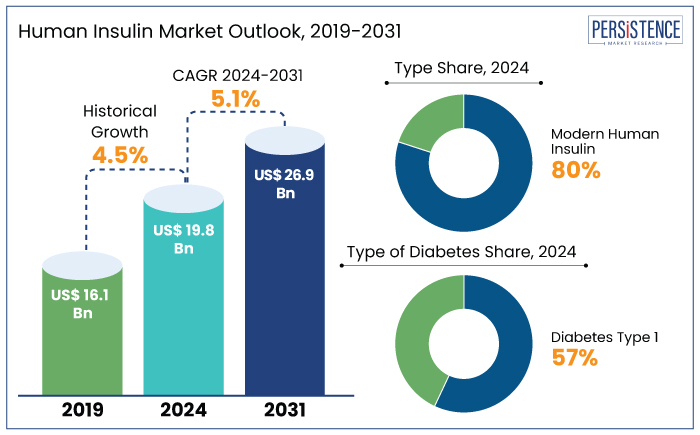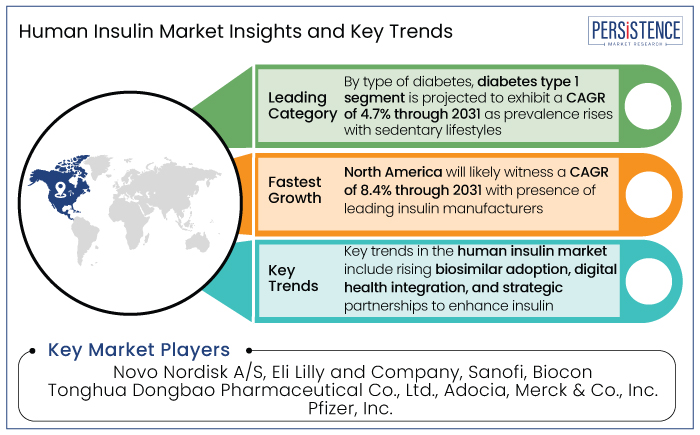Industry: Healthcare
Published Date: January-2025
Format: PPT*, PDF, EXCEL
Delivery Timelines: Contact Sales
Number of Pages: 187
Report ID: PMRREP3308
The global human insulin market is estimated to increase from US$ 19.8 Bn in 2024 to US$ 26.9 Bn by 2031. The market is projected to record a CAGR of 5.1% during the forecast period from 2024 to 2031.
The trend for personalized medicine in diabetes care is creating a niche for tailored insulin therapies. Providers are leveraging genetic insights and unique diagnostics to offer customized treatment plans. Companies like Sanofi have launched initiatives integrating AI and patient data to refine dosing protocols for better outcomes, showcasing the surging potential of personalized insulin therapy.

Key Highlights of the Market
|
Market Attributes |
Key Insights |
|
Human Insulin Market Size (2024E) |
US$ 19.8 Bn |
|
Projected Market Value (2031F) |
US$ 26.9 Bn |
|
Global Market Growth Rate (CAGR 2024 to 2031) |
5.1% |
|
Historical Market Growth Rate (CAGR 2019 to 2023) |
4.5% |
North America is emerging as a dominating force in the human insulin market and is anticipated to hold a share of 41.4% in 2024. It is projected to witness a CAGR of 8.4% through 2031. This growth is driven by the strong presence of leading insulin manufacturers, intense competition, and rising prevalence of type 1 diabetes.
The significant rise in insulin prices over the past decade has further bolstered North America's share of the global market, making it a key contributor to industry revenue. For example,
Substantial increase in insulin prices in the U.S. over the past decade has significantly contributed to revenue generation. Despite growing advocacy for price controls, the market remains lucrative, driven by ongoing investments in research and development.
Novel insulin delivery systems, such as insulin pens and pumps, are also gaining popularity, enhancing treatment adherence and quality of life for diabetes patients. North America’s robust healthcare infrastructure and favorable insurance reimbursement policies further support market expansion. These factors collectively enable the region to command a prominent share of the global human insulin industry, making it a key driver of industry growth.
Modern human insulin dominates the market, and it held around 80% of the share in 2024. It will likely witness a CAGR of 5.1% through 2031. This is attributed to the fact that extensive research is being conducted to bring out this type of human insulin in the market.
The way of administration for both traditional and modern human insulin is through drugs or delivery devices. Among the drugs, there are insulin analogues and biosimilars (NovoRapid/Novolog, Lantus, and Humalog) and human insulin biologics (Mixtard, Insulatard, and Actrapid, Humulin, and Insuman). The delivery devices include pens, pen needles, and syringes.
The number of diabetic patients across the globe is rising at an alarming rate. This, in turn, calls for a greater quantity of human insulin to be brought to the market. Hence, traditional human insulin is there to stay. However, to address the rising demands, modern human insulin is something both healthcare practitioners and end-customers are looking up to.
The global human insulin market is experiencing steady growth, driven by rising diabetes prevalence and developments in insulin formulations. Insulin, a critical therapy for managing diabetes, continues to evolve with the development of biosimilars, offering cost-effective alternatives to traditional insulin products.
Such innovations are particularly beneficial in emerging markets, where affordability and access remain significant challenges. Digital health solutions also play a key role, with technologies such as mobile apps and Continuous Glucose Monitors (CGMs) enabling more personalized and effective diabetes management.
Strategic partnerships and local production initiatives like the collaboration between Novo Nordisk and Aspen Pharmacare are addressing regional insulin shortages and improving market access. As a result, the market is likely to see further expansion, particularly in regions with high unmet needs and surging diabetes rates. These trends indicate a positive outlook for the human insulin industry in the forecast period.

From 2019 to 2023, the global human insulin market witnessed steady growth. It was mainly driven by increasing diabetes prevalence, technological developments in insulin delivery, and rising investments in biosimilars.
The market was valued at around US$ 16.1 Bn in 2019, reaching about US$ 18.8 Bn by 2023, with a CAGR of nearly 4.5% from 2019 to 2023. This growth was attributed to rising incidence of diabetes worldwide, improved access to insulin therapies, and high demand for novel insulin delivery devices such as pens and pumps.
From 2024 to 2031, the market is anticipated to maintain a robust growth trajectory. With a growing focus on biosimilars, cost-effective insulin options, and continued innovations in long-acting and rapid-acting insulin formulations, the market is projected to witness a CAGR of 5.1% through 2031.
Rising diabetes cases, particularly in emerging markets, coupled with innovations in personalized treatment and digital health solutions for diabetes management, will continue to drive demand. Government initiatives to improve access to insulin, along with technological integration in treatment plans, will likely shape the market in the next ten years.
Rising Prevalence of Diabetes to Bolster Growth Worldwide
Increasing global prevalence of diabetes is a primary driver for the human insulin market. For example,
Type 1 diabetes, in particular, requires regular insulin administration for survival, further boosting the market. Additionally, technological developments in insulin delivery systems, such as pens, pumps, and smart insulin devices, are improving treatment outcomes and patient compliance. Companies are investing heavily in research to develop innovative, longer-acting insulin formulations and biosimilars to meet this growing demand.
Lifestyle changes and rising obesity rates are significant risk factors for type 2 diabetes, which are increasing the patient population. With healthcare systems worldwide emphasizing better diabetes management and governments implementing supportive reimbursement policies, the human insulin industry is poised for robust growth in the next ten years.
Demand for Over-the-counter (OTC) Insulin to Skyrocket in Future
Regulatory changes in certain regions have paved the way for OTC insulin products, increasing accessibility for patients who previously faced barriers to obtaining prescriptions. For instance,
Pricing Disparities and Regulatory Challenges May Hamper Demand
The human insulin industry faces several significant restraints that could hinder its growth. One of the primary challenges is the uneven pricing of insulin across different regions. In developed countries like the U.S., insulin prices have increased substantially over the past decade, creating affordability issues for several patients and putting pressure on the healthcare system.
The price disparity is even more evident in emerging economies, where access to insulin remains limited due to high costs and inadequate healthcare infrastructure. For instance, the World Health Organization (WHO) has highlighted that access to affordable insulin is a leading issue in low- and middle-income countries. It is resulting in millions of people being under-treated or untreated for diabetes.
Stringent regulations for drug approvals, especially in emerging markets, contribute to delays in introducing new insulin formulations. The lengthy approval process can lead to a demand-supply imbalance, where demand for insulin exceeds the supply, further exacerbating access issues.
Regulatory bottlenecks delay the entry of biosimilars and new treatments, which could help lower costs and improve access. These factors combined are likely to restrain the market, limiting the potential for global growth. It is especially evident in regions where insulin access is critical for managing the rising diabetes prevalence.
Innovations in Digital Health, Biosimilars, and Strategic Alliances Create Prospects
The global human insulin industry is poised for steady growth, with several future opportunities available for key players. A key opportunity lies in the development and rise of biosimilars, which are set to address affordability challenges, particularly in emerging markets.
Regulatory barriers are loosening, and approval processes are becoming more streamlined. Hence, biosimilars are gaining traction and offering cost-effective alternatives to traditional insulin products. Companies that invest in biosimilars, such as insulin glargine and other long-acting insulin formulations, can tap into markets where access to affordable insulin is critical. These include low- and middle-income countries.
Developments in digital health and smart insulin delivery devices present significant opportunities. Integrating insulin management with digital technologies such as mobile apps and Continuous Glucose Monitors (CGMs) can enhance patient outcomes and adherence to treatment plans. Demand for such solutions is on the rise as diabetes management becomes increasingly personalized and tech driven.
Rising Cases of Pediatric Diabetes to Open the Door to New Opportunities
Insulin suppliers have a chance to reach the underprivileged group as the number of instances of pediatric diabetes rises. To address this demand, specialized insulin formulations for kids and family support initiatives are being created. Businesses can greatly increase their market share by concentrating on pediatric formulations, such as rapid-acting insulins for younger populations. For example,
Novo Nordisk A/S dominates the human insulin industry and is likely to maintain its leadership due to its strategic partnerships and innovations in drug discovery technologies. Additionally, substantial investments in research to develop unique treatment solutions have solidified the company’s strong market position.
The global human insulin industry features intense competition, with key players like Novo Nordisk A/S, Sanofi, Eli Lilly and Company, and Biocon leading the industry. These companies leverage strategies such as partnerships, biosimilar developments, and regional expansions to strengthen their market positions.
Recent initiatives, including Novo Nordisk’s partnership with Aspen Pharmacare for insulin production in South Africa and Biocon’s acquisition of Viatris’ biosimilar business, highlight the dynamic nature of the market. Furthermore, significant investments in research and innovations in insulin delivery systems, such as pens and pumps, are intensifying competition.
Recent Industry Developments
|
Attributes |
Details |
|
Forecast Period |
2024 to 2031 |
|
Historical Data Available for |
2019 to 2023 |
|
Market Analysis |
US$ Billion for Value |
|
Key Country Covered |
|
|
Key Market Segments Covered |
|
|
Key Companies Profiled |
|
|
Report Coverage |
|
|
Customization and Pricing |
Available upon request |
By Type
By Type of Diabetes
By Distribution Channel
By Region
To know more about delivery timeline for this report Contact Sales

The market is estimated to increase from US$ 19.8 Bn in 2024 to US$ 26.9 Bn by 2031.
The global human insulin industry is being propelled by rising diabetes prevalence.
Novo Nordisk A/S, Eli Lilly and Company, Sanofi, and Biocon are few of the leading industry players.
The industry is projected to record a CAGR of 5.1% during the forecast period from 2024 to 2031.
A prominent opportunity lies in rising biosimilar insulin production, which is driven by surging diabetes prevalence and affordability demands in emerging countries.